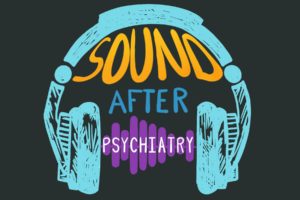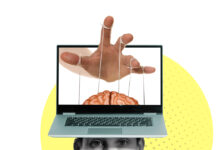When Kim Wichera asked me to be on a panel co-sponsored by SoundsAbout Gallery and CTM Festival on the theme of sound and psychiatry, I immediately understood the potential of exploring the effects of modern psychiatry through this lens. Focusing on how I listened to and made sounds before and after psychiatry seemed a rich and poetic way to further understand its impact on my life.
The panel will be held on March 9 via Zoom, moderated by Kim and with panelists including me, Dr. Tom Rice, Dr. Kristina Eichel, and Kristel Jax. Register here for free.
Some of the questions Kim, who is working on a long-term project about sound and psychiatry, posed to me and the other panelists were: Who influences the act of listening in the psychiatric system? Who is responsible for sounding in the psychiatric system? How is the environment designed and built to influence sound?
My initial thoughts were that there are really three sound environments to talk about: the time before hospitalization – for me, a time filled with music. The time I spent within the mental institutions – where sound interacts with the systems of psychiatry and power– and then, afterward, in the outside world as it was affected by this trauma.
An important understanding of the definition of sound for me was that it acts as a courier for meaning.

Music and its lyrics were the most important sounds in my teens. Music informed everything. What friends I had, what ideas I believed in, what identities I experimented with. It was a powerful, beautiful, forgiving, and malleable container for my chaotic young life.
In part, just before my first hospitalization at 21, my altered states existed in relationship with the music, metaphors, and veiled language in the work of musicians like Tori Amos, who I had been listening to since a friend played Precious Things for me on a cassette tape in his car in the mid-’90s –I was 15. The nature of the music Tori creates–or co-creates, as she might put it–with beings she calls “The Muses” opens itself up to the limitlessness of time and context in a way that allows the listener to infuse it with their own personal meaning. At that time in my life, her music became a kind of portal to a different constellation of meanings as powerful music, fine art, dance, and writing can be.
For me, altered states were an explosion of meaning-making and metaphor, and the music and words of artists like Tori, Jeff Buckley, Led Zeppelin, and others mirrored a kind of spiritual beauty I saw growing almost exponentially around me at that time. It validated the mystical aspects of art, sound, and language that I had always understood.
What led me into mental institutions three times in my early 20s and once in my early 30s, has a lot to do with sound – a soundscape only I could hear, composed of voices. We could say, then, that the initial point at which psychiatry became activated was involved directly with sound. Sound that was personal, sacred, sometimes frightening, and mysterious to me. I experienced altered states just like how I dream at night, as we all dream – alone, and with no witnesses. Perhaps the conflict between the stranded sound of my voices, unable to be validated in the world, known only by me, and psychiatry’s force against them, was the start of a fracture within myself.
When I came in contact with psychiatry, I suffered the results of a tragic intention: the intention to forcefully limit sound, meaning-making, and metaphor. First by stigmatizing what I experienced – what they considered an excess of meaning – by labeling it a disease. And second, by affecting the ability, in biological terms, of my body to experience sound and meaning fully as it moved through my nervous system, now sedated by heavy psychiatric drugs.
Sound is something that passes through the body and perhaps the soul, if you believe in that sort of thing, and that is what makes it what it is to us–what makes it whole. In a way, after psychiatry, sound became incomplete.
The limiting of meaning and the sedation of my nervous system also created a disconnect from my self and my voice – one of the more important ways we make sound in the world. In the wake of psychiatry, there was a fracture, a gulf that opened between me and the authentic sound of my voice when it is connected and resonates with my truth. The seed of an intense fear of expressing myself was planted as I observed that making sounds in the world now exposed me to force.
Tori Amos talks a lot about song lines as signatures of places on earth, almost like a memory of a place and the energy and ancestors there. Mental hospitals may have their own song lines. I feel there was a kind of secret and sacred song in the hospital, a painful one that revealed our common fragility, beauty, and humanity. While at the same time the sound-scape around me, the chorus, was a warning, a threat.
The strategy of psychiatry within a mental ward is to isolate and remove sound. Remove the choice around which sounds you are permitted to make, to hear, or give meaning to. The only sounds within these institutions that are given the right to be meaningful are those of the doctors and nurses. In this way, sound becomes a tool in a struggle for power.
The sounds of suffering in psychiatric hospitals are mostly episodic amidst stretches of silence: sounds of bodies and voices moving sluggishly, some in a process of self-harm – perhaps in reaction to restraint, or slick and quick moves towards restraint by attendants. And still other times when the sounds of a patient’s suffering are neglected and go on for hours.
My experience was that the system of sound formed by power dynamics and punishment created by the institutions follows you into the world afterward in some really tragic ways. One more obvious way was through being tethered to therapy and psychiatrists–which, for me, often felt like an extension of the sound environment of hospitals, where my voice was always questioned, while the practitioner’s voice was given priority and authority. So much so that words of stigma, gaslighting, and abuse became, in some people’s minds, valid.
But there are so many other ways the experience of institutionalization followed me and affected the way I interacted with sound and how I created it in the world afterward. Being in this environment began a process of internalizing psychiatry’s attempt to limit sound and meaning-making and to enforce my own meaninglessness–most forcefully by taking away my ability to see my altered states as anything other than disease.
The effect of the sound-scape of suffering in a mental ward planted an aversion to making sounds like crying, or screaming, or even making movements, like dancing. After hospitalization, limiting my own sound-making became a path to safety in the world on many levels. As the years went on, singing, loudly weeping, or even speaking the truth of my experiences became more and more painful and scary because these sounds made me feel unsafe and exposed to force, or to legitimately fear being abducted and imprisoned.
My relationship with music after I was hospitalized changed as well. Seeing the meaning in lyrics or in music became frightening. Being deeply moved by meaning and metaphor in art became a symptom of disease. There is this idea in psychiatry of keeping profoundly meaningful things from people diagnosed with “mental illnesses” –like sad music, dark books, profound poetry. I remember my mother gave me an American Psychological Association (APA) writing style guide to read during hospitalization after 9/11 because she was told to bring something light. The doctors were trying to be sure I was not “moved.”
Looking at my experiences in the context of sound in preparation for this panel, I can see the tragic effect of psychiatry on my relationship with meaning, metaphor, self, and sound in a different way. I see how the start of healing for me over the last few years was, in part, in bridging the fracture with meaning and its courier–sound. It was a wound inflicted by psychiatry and its own fear of things it does not understand, sounds it does not hear.















What a beautiful interpretation and examination of sound Karin! I’m grateful there are people like you who do the hard work or brining meaning (and hope) to those dynamics languishing in tropes and memes (spaces) dispensed through power. Thank you!
FWIW: I’ve recently become more aware of sound as a (far more) critical aspect of consciousness. I recently bought a “white noise” machine to assist with sleep and tinnitus mitigation. What I discovered is that I know I’m awake before I can hear it (the rain, etc.), and feel my body first-and thoughts-before I can make out the sound. I won’t go further with my observations, but suffice to say there’s allot of room for further examination of sound!
Report comment
As one who was told to turn off music that spoke to me, by a psychologist. When in reality, music is all about the human experience. And art, in general, is all about the human experience, in the time in which one lives. At least, that’s what I was taught to record, in my artwork, in art school.
The “mental health workers” are now terrified of my now “too truthful,” “insightful,” “work of smart female,” artwork. Since their systemic child abuse covering up crimes are evident within my work. I’d very much like to see the “mental health professions” end their systemic child abuse covering up system.
I’ll try and get a Covid piece I planned to do, done in the next month. It won’t be a pointillism piece, as I had previously planned to do. But I’ll try to get a piece done, in a timely enough manner, that it can be included in your show.
But I’m not ready to pay a professional photographer to properly photo document my work, so I don’t know if the free cropping services online, will give me a good enough image for your show. You really should give artists more than one month, to give you a piece. Since those artists who were “professionally” trained, do artwork that takes much more than a month, to create, and have properly photo documented.
Report comment
Someone Else,
I want to see!
Report comment
Hey Someone Else, I do hope you get it finished. I see your point about the time given for the call, but this was specifically for work that likely had already been made over the last year. Looking forward to seeing the work, and I wouldn’t worry too much about the photography, online display of artwork does not require as much of a professional hand to get it to look good. So give it a go. I think it will work out nice.
Report comment
Karin J.,
Hear! Hear!
Report comment